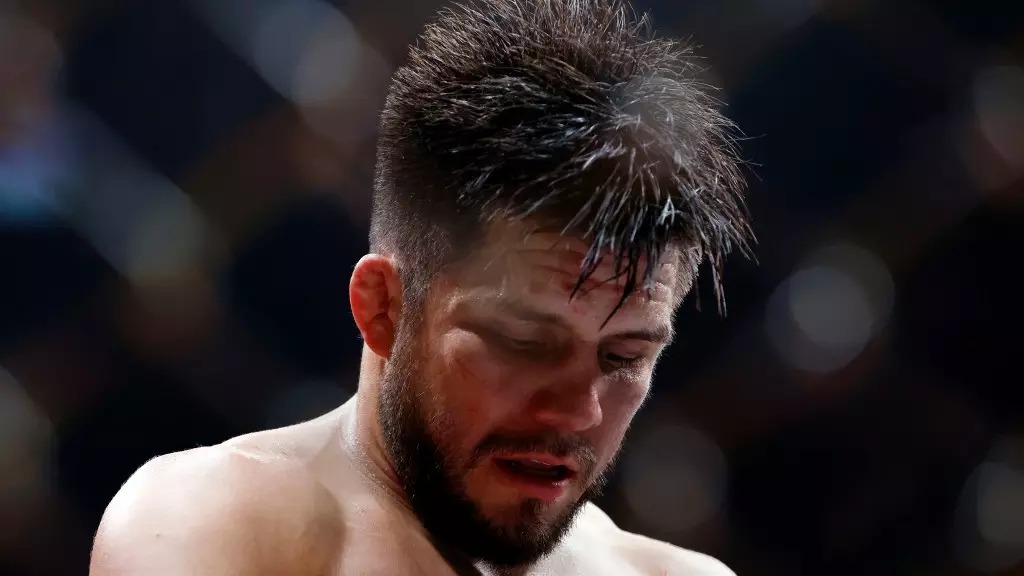Henry Cejudo’s recent experience in the Octagon has not just been a test of athletic prowess but a profound personal challenge. Following his controversial loss to Song Yadong at UFC Fight Night 253, the former two-division champion is grappling with the repercussions of a severe eye injury—a setback that has significantly impacted his perspective on the sport he once viewed as merely a competitive arena. What should have been a prestigious fight for Cejudo turned into a moment of reckoning, raising questions about longevity and health in a demanding profession.
In the bout, an accidental eye poke from Song halted the action, leading to confusion, frustration, and ultimately, an unsatisfactory decision. Cejudo’s determination to continue fighting through the discomfort speaks volumes—yet, this resilience comes at a cost. His reliance on a second medical opinion underscores the uncertainty that athletes face in the wake of injuries. It’s poignant to note that Cejudo’s physical condition isn’t just altering his fighting career but is reshaping how he views his future outside of fighting, particularly his responsibilities as a father.
The Psychological Toll of Combat Sports
Cejudo’s admission of seeing double as a result of the injury is alarming. No athlete steps into the ring expecting lasting damage, yet Cejudo’s words resonate with the brutal reality of combat sports. He expresses a desire to balance his competitive nature with the instinctual need to safeguard his health—an ethos not all fighters achieve. His contemplation of retirement reveals a deeper concern for both his physical wellbeing and his role as a family man. This juxtaposition illustrates the psychological toll of a sport defined by violence; even for the most accomplished fighters, the reality of long-term consequences can spark self-doubt.
Unlike many fighters who mask their fears behind bravado, Cejudo emerges transparent about his vulnerabilities. This willingness to share his plight not only humanizes him but also invites broader conversations about mental health in the hyper-competitive sphere of mixed martial arts. How many fighters, past and present, wrestle with similar anxieties but remain silent for fear of showing weakness? Cejudo’s honesty may well serve as a catalyst, empowering others within the sport to confront their health concerns head-on.
Legal Action and Its Implications
In light of the injury, Cejudo plans to pursue legal avenues against those he believes mishandled the situation during the fight. His call for accountability emphasizes the precarious balance between athlete safety and competitive integrity—it’s a contentious issue that has will continue to persist within the UFC and beyond. The call for a “no contest” ruling reveals the dissatisfaction felt not only by Cejudo but potentially by fans and other fighters who crave fairness in the sport.
However, this legal pathway raises important questions: How much control should fighters have over the outcomes of their matches? If an organization allows for nebulous rules to dictate the course of a fighter’s career, is it truly fostering a safe environment? While Cejudo might find solidarity with fans and fellow fighters, the implications of such actions could ripple through the sport, possibly initiating changes in policies regarding injury assessments and fight regulations.
Living with Duality: The Fighter and Family Man
Cejudo’s narrative is one of duality; the relentless competitor grappling with the reality of walking away to ensure he can be present for his children. His late-career reflections force the audience to reconcile the fighter with the man behind the gloves. Undoubtedly, the ethos of fighters is to push themselves beyond their limits, but Cejudo’s willingness to consider retirement for the sake of his family offers a refreshing perspective. It’s a breakdown of the notion that fighters must endure pain at any cost, challenging the glorification of extreme sacrifice often seen in boxing and mixed martial arts.
This perspective serves to redefine success in the sport—not merely derived from wins and losses but through life outside the cage. How many championships are worth sacrificing the finer joys of life? The argument is not only about physical health—it encompasses emotional and psychological well-being too. Cejudo stands at a crossroads, inviting further dialogue about the responsibilities both fighters and organizations have toward one another in prioritizing health, safety, and the right to a fulfilling life beyond the sport.
Cejudo’s story is not simply about the battle within the Octagon; it serves as a narrative on resilience, challenging notions of masculinity, accountability, and the long-term ramifications of combat sports. As he contemplates the future of his fighting career, one can only hope that whatever path he chooses next reflects his values as an athlete and a family man, inspiring others to think critically about their own journeys in the brutal world of mixed martial arts.

